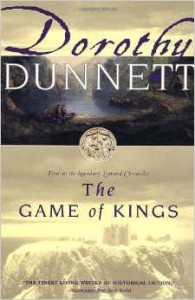 I write almost exclusively fantasy and science fiction, so the fact that The Lymond Chronicles by Dorothy Dunnett is both a historical fiction and my very favorite series of books should say something about how highly I regard it. The books have been around since the 1960s, yet the only people I have ever met who’ve read them are my mother (who convinced me to try the first book) and the people I’ve convinced in turn. To me this is nothing short of a travesty.
I write almost exclusively fantasy and science fiction, so the fact that The Lymond Chronicles by Dorothy Dunnett is both a historical fiction and my very favorite series of books should say something about how highly I regard it. The books have been around since the 1960s, yet the only people I have ever met who’ve read them are my mother (who convinced me to try the first book) and the people I’ve convinced in turn. To me this is nothing short of a travesty.
The six books are set in the middle of the sixteenth century and follow Francis Crawford of Lymond. Francis (known simply as “Lymond” to all but his closest friends) is already a wanted traitor to his homeland of Scotland when he returns there intent on clearing his name as the series opens. Lymond is, in the words of the author herself, “a classical hero: a natural leader whose star-crossed career, disturbing, hilarious, dangerous, I could follow in finest detail for ten years.” He is a leader, scholar, warrior and above all, rogue. No mere Mary Sue or shallow Renaissance James Bond, Lymond is a tragically flawed man of deep feeling and a tortured past, and might be better compared to a Renaissance mix of Jaime Lannister and Rhaegar Targaryen.
The series stretches from Lymond’s home in Scotland to the headquarters of the Knights Templar in Malta to the courts of Suleiman the Magnificent in the Ottoman Empire and Ivan the Terrible in Russia. The breadth and depth of research Dunnett undertook to bring Renaissance Europe to life is nothing short of staggering. Lymond finds himself involved in many of the grand historical events of the time, blending so seamlessly into real history (and surrounded by so many real historical figures) that you’ll swear he must have been there.
Dunnett performs a neat narrative trick which was, for me at the time I first read the series, novel: at (virtually) no point in the series are you ever allowed inside Lymond’s head. Save for one critical scene, the POV always follows other characters. You are permitted to observe Lymond but never to inhabit him. This makes him central to the series but also keeps him at arms length from the reader, a necessary and fascinating technique to maintain Lymond’s air of mystique. It’s a technique I’ve used in my own writing since learning it from Dunnett.
Fair warning: these books are challenging reads, and the first book (The Game of Kings, referencing chess and not A Song of Ice and Fire) has the hardest prose to parse. Dunnett moderates her prose (relatively speaking) in the remaining volumes (Queen’s Play, The Disorderly Knights, Pawn in Frankincense, The Ringed Castle and Checkmate). But throughout the series Dunnett features quotes in other languages. Lymond is a polyglot and is not afraid to flaunt it. His use of multiple languages is not enough to disrupt your understanding of the books if you can’t translate, but it might be frustrating to those who like their prose clear and unaffected. There is an excellent companion book available for this series (and The House of Niccolo, Dunnett’s other series) that will translate the quotes for you and provide historical context, adding to the enjoyment of the diehards like myself.
The bottom lines are these. If you love action and adventure, read these books. If you love fascinating rogue heroes/anti-heroes, read these books. If you love star-crossed romance (in both senses of the word) read these books. If you love political intrigue and deeply-buried secrets, read these books. If you love worldbuilding and attention to detail, read these books. If you love to have your heart torn out of your chest, read these books. If you love soaring triumph, read these books.
If you love great books, these are the books for you.
Dorothy Dunnett sadly passed away shortly after I read this series for the first time back in 2001. But her work stands as a fitting legacy. Earlier I said that Lymond blends into history so seamlessly you’ll swear he was there. Alas, Francis Crawford didn’t exist in real life. But by the end of this series, you’ll wish he had.
